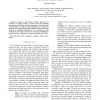726 search results - page 62 / 146 » Reasoning about Feature Models in Higher-Order Logic |
CLIMA
2007
13 years 10 months ago
2007
Abstract. Failures are unavoidable in many circumstances. For example, an agent may fail at some point to perform a task in a dynamic environment. Robust systems typically have mec...
ATAL
2007
Springer
14 years 21 days ago
2007
Springer
Interactions between agents in an open system such as the Internet require a significant degree of flexibility. A crucial aspect of the development of such methods is the notion o...
TIME
2009
IEEE
14 years 3 months ago
2009
IEEE
—Towards a data-centric workflow approach, we introduce an artifact model to capture data and workflow management activities in distributed settings. The model is built on Acti...
IJCAI
2007
13 years 10 months ago
2007
We present a fully connectionist system for the learning of first-order logic programs and the generation of corresponding models: Given a program and a set of training examples,...
AIMSA
2008
Springer
14 years 3 months ago
2008
Springer
Integrated modeling of temporal and logical constraints is important for solving real-life planning and scheduling problems. Logical constrains extend the temporal formalism by rea...

